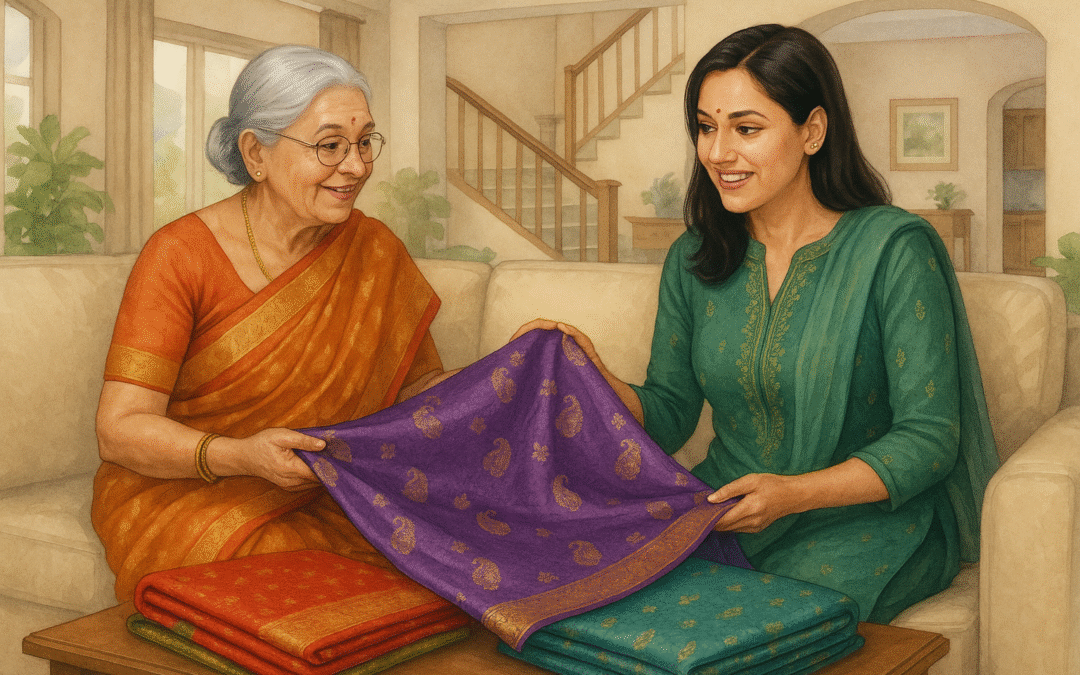Savitri Aunty hummed a melodious rendition of the late Carnatic music maestro MS
Subbulakshmi, as she carefully kept her sarees from the neatly arranged cupboard into suitcases.
I watched in awe at the exquisite collection.
I have often seen Aunty draped in those lovely sarees when she visited the temple or attended a
wedding along with Uncle.
Pointing towards a saree with a beautiful combination of navy blue and pink border,
with a blush on her wrinkled face, she said, “This is my wedding saree.”
I expressed my admiration for the texture and durability of the nine-yard saree, marveling at the
unfaded zari borders.
Aunty explained that in her time, women wore the nine-yard saree on all auspicious occasions,
unlike the present generation. Despite repeated usage, the unfaded zari stood testimony to the
flawless work in those days, nearly five decades ago.
Recounting the instances when she wore the saree, Savitri Aunty shared how her co-sisters envied
her for possessing such a unique piece, unlike their monotonous red wedding sarees.
Aunty rolled her eyes dramatically as she described how her father had bravely deviated from the
tradition of red sarees, facing opposition from other family members.
Running her fingers fondly over a six-yard silk saree with a lotus color and a green border, she
started sharing the story behind it. Her husband had gifted her this saree during her eighth month
of pregnancy, and it had attracted attention and sparked discussions among relatives about her
husband’s love for her.
Upon the birth of their son, her husband had gifted her another exquisite six-yard silk saree. She
displayed that one, too, with utmost delight.
“Uncle had earnestly requested me to continue wearing the silk sarees even after he would be
gone. He didn’t want me to stick to age-old traditions wherein a widow has to wear only sober
clothing.”
Tears rolled down her cheeks as she missed her better half, who had passed away the previous
year at the age of 77.
“I do not wish to disappoint his kind soul. I feel he is watching me from wherever he is. That is
why I am taking these sarees along with me.” She wiped her moist eyes.
Aunty’s son Rajan, who lived abroad, was scheduled to arrive in India today and had assured her
that she wouldn’t be staying alone in her house any longer.
He had also indicated about having finalized the sale of the house.
Savitri Aunty always spoke fondly of her only son, daughter-in-law, and her two grandchildren.
The septuagenarian’s life revolved solely around them.
A week ago, Aunty told me she would need my help packing her bags and organizing the
final wrap-up of things in her house on the day of her son’s arrival. With pride lit large on her face, she explained that her son would come only for a day and take her with him.
I had taken the day off from work to assist her in packing. Her fondness for various colored
combination sarees became evident as I arranged her suitcases.
She then handed over a beautiful saree to me. It was an off-white one with a maroon border.
“Keep this as a gift from me, and wear it occasionally. It will remind you of me.”
I assured her that I didn’t need any momento to remember her.
Though we were neighbors, Aunty had been more like a mother figure to me.
After my parents passed away in an accident and in the same year when I got separated from my
husband, both Uncle and Aunty had been like pillars of support.
“Keep it,” she said. “You need to wear sarees often. What if you are single now? Someday, you
will find someone.” She sounded very confident.
At 45, my hopes of finding a compatible partner had waned. A faint smile escaped my lips.
As we were clearing the kitchen, Savitri Aunty asked me to take any extra groceries and
perishable items, teasing me about my lack of cooking skills.
“I have often seen the food delivery persons at your doorsteps.” She chided me lovingly.
I hardly bothered to cook. Preparing a meal for a single person, according to me, was a
cumbersome job, but Savitri Aunty opposed my theory vehemently. She was an excellent cook
and would prepare small quantities with utmost precision. She had, in fact, suggested that I should
share her meals every day. She often offered me her delicious preparation, but I would decline to accept it, feeling embarrassed. That wouldn’t discourage her; every other day, she would be at my threshold with some food whose aroma forced me to give up on my stubbornness.
I smiled as I envisaged Aunty wearing the pretty silk sarees and preparing delicious food in her
son’s house. I was almost certain that she would garner admirers there with her charming
versatile personality.
Just as we finished arranging the suitcases, Rajan arrived. He seemed confused at the sight of the
luggage.
“Ma, you don’t need to carry your sarees. They have a uniform there for everyone. Elder ladies
like you are given a flowing gown in blue and white while men have a similar color combination
of shirt and trousers. I have chatted with them and understood how well they care for elderly
people.”
As the reality dawned upon her, Aunty’s face showed a mix of emotions, realizing that she
wouldn’t wear her beautiful sarees anymore and that her son had made this decision for her
without bothering to consult her.
She struggled to camouflage her disappointment behind an enforced smile.
My eyes blurred at the sight of Aunty wearing a simple gown and sitting idle.
Without uttering a word, I picked up the suitcases and gestured to Aunty to follow me.
I shall not need the food delivery people anymore. Cooking for two would be fun, and that too under the auspices of a lady like Savitri, Aunty.
We entered the threshold of Aunty’s new abode.
This story won the third prize in Strands International Flash Fiction-20

